OTTAWA – The role of faith will not be left behind as Canada marks its 150th birthday in 2017. Cardus, Canada’s Christian think tank, unveiled its 40-member Cabinet of Canadians on Nov. 1, whose role will be to affirm faith’s central role in building Canada as it celebrates its landmark anniversary of Confederation. The Cabinet, part of the Faith in Canada 150 project, includes Toronto Cardinal Thomas Collins, Evangelical Fellowship of Canada president Bruce Clemenger, Catholic Christian Outreach (CCO) president Jeff Lockert and National Council of Canadian Muslims executive director Ishaan Gardee. It will help lead the conversation regionally and nationally on the importance of religious faith in Canada’s history. “There is growing discrimination against people of faith in Canada,” said Andrew Bennett, Cardus senior fellow and Canada’s former Ambassador of Religious Freedom. “We must speak out confidently and uphold this fundamental freedom in the face of growing intolerance of religious belief in our society.” The Cabinet includes not only religious leaders, but also academics, social entrepreneurs and business leaders who will act as a “vanguard” for the message that faith matters in Canada, he said. Cabinet co-chairs are Shachi Kurl, a public policy analysist with the Angus Reid Institute, and Balpreet Singh Boparai, legal counsel for the World Sikh Organization of Canada. While about 20 members of the cabinet represent Christian leaders from Catholic, Orthodox and various Protestant backgrounds, the cabinet includes a wide breadth of other faiths.
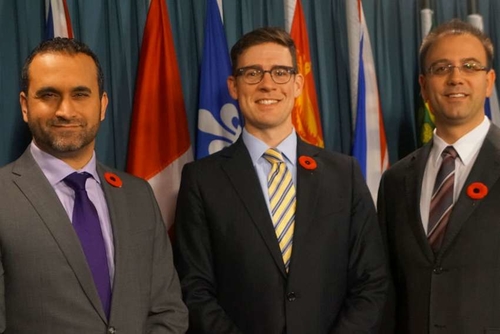
Cardus selects cabinet to mark Canada’s 150th
November 3, 2016
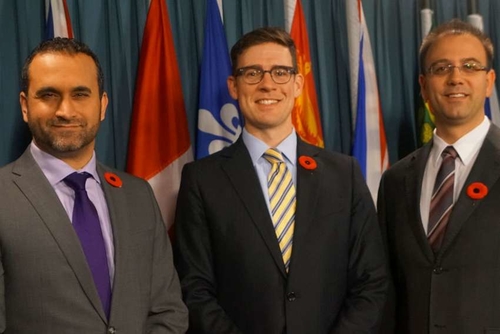
Une Nouvelle Initiative Multiconfessionnelle dans une Conjoncture de Moins en Moins Favorable à la Liberté Religieuse au Canada
Le 1er novembre 2016 OTTAWA—Le Dr Andrew Bennett, associé du groupe Cardus et président du Cabinet des Canadiens, a rendu public les noms de quelque 40 personnes qui s'emploieront à affirmer le rôle central que la foi a joué dans l'histoire du Canada et qu'elle continue de jouer aujourd'hui. " La pratique de la foi religieuse au Canada incite les Canadiens à poser de grands gestes ", a déclaré Bennett. " La foi est tout aussi bien publique que privée. Elle nous définit. Elle nous appelle à agir. Elle est vraie. Et elle est profondément canadienne. " Shachi Kurl, un analyste de politiques publiques, et Balpreet Singh Boparai, conseiller juridique de la World Sikh Organization of Canada, seront les co-présidents du Cabinet, qui sera composé en outre de personnes bien connues comme Anita Bromberg, directrice exécutive de la Fondation canadienne des relations raciales, Colin Jackson, président du conseil d'administration du Rosebud Centre for the Arts de Calgary, Shimon Fogel, chef de la direction du Centre for Israel and Jewish Affairs, Imam Abdul Hai Patel, fondateur et ancien coordonnateur du Canadian Council of Imams, et son éminence le cardinal Thomas Collins, archevêque catholique de Toronto. On trouvera ici une liste complète des membres du Cabinet. Le Cabinet des Canadiens est une initiative s'inscrivant dans le cadre de Foi dans le Canada 150 - un projet spécial de Cardus anticipant le 150e anniversaire de la Confédération en 2017. Les membres du Cabinet participeront à des activités, prendront la parole en public et écriront sur les apports de la foi à la vie publique au Canada. Ce faisant, ils expliqueront comment leur foi a enrichi leur vie et encadré leur engagement au sein de la collectivité. Bennett estime qu'il importe de faire place à des expressions publiques de la foi et de reconnaître ainsi la longue tradition de liberté religieuse au Canada, et ce, dans un contexte culturel où celle-ci est de plus en plus contestée. Selon Bennett, " les cas de discrimination contre les gens de foi au Canada se multiplient ". " Nous devons nous exprimer avec confiance et défendre cette liberté fondamentale qui se heurte à une intolérance croissante à l'égard des croyances religieuses dans notre société. Il suffit de considérer le cas de l'Ontario où les médecins pourraient être obligés d'aller à l'encontre de leur conscience en collaborant à l'euthanasie, et ce, en violation de leurs croyances religieuses les plus profondes. Des problèmes semblables se posent dans le cas des hôpitaux catholiques qui sont invités à faire fi de leurs objections à l'euthanasie, ou dans celui de l'Université Trinity Western dont les diplômes décernés par la faculté de droit ne sont pas reconnus par certaines Sociétés du Barreau en raison du pacte communautaire de cette institution privée de confession évangélique. " Le Cabinet des Canadiens souhaite commémorer le rôle historique de la foi dans notre pays, dans nos institutions et dans notre vie commune tout en réaffirmant cette foi aujourd'hui.-30- À propos de Cardus Cardus est un centre d'études axé sur le renouvellement de l'architecture sociale nord-américaine. Il poursuit des recherches indépendantes et originales, diffuse plusieurs revues et organise périodiquement des activités avec des associés et des organismes intéressés partout au Canada et aux États-Unis. Pour en savoir davantage, prière de consulter le site www.cardus.ca et de suivre nos activités sur Twitter @cardusca. RENSEIGNEMENTS SUPPLÉMENTAIRES POUR LES MÉDIAS Daniel Proussalidis Cardus - Directeur des communications 613.241.4500 x.508 dproussalidis@cardus.ca
November 1, 2016
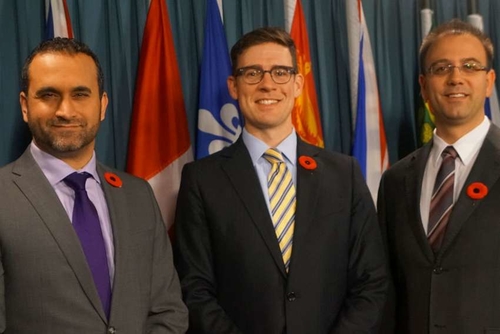
New Multi-Faith Initiative Launched Amid Worsening Climate for Religious Freedom in Canada
NEW MULTI-FAITH INITIATIVE LAUNCHED AMID WORSENING CLIMATE FOR RELIGIOUS FREEDOM IN CANADA Dr. Andrew Bennett announces full membership of Cabinet of Canadians November 1, 2016 OTTAWA—Dr. Andrew Bennett, Cardus Senior Fellow and Chair of the Cabinet of Canadians, has formally announced the names of almost 40 distinguished individuals who will help affirm the central role faith has played in Canada's history and continues to play today. "The practice of religious faith in Canada motivates Canadians to great acts," Bennett said. "Faith is public and private. It defines us. It calls us to action. It is true. And it is deeply Canadian." Shachi Kurl, a public policy analyst, and Balpreet Singh Boparai, legal counsel for the World Sikh Organization of Canada, will serve as Cabinet co-chairs. The Cabinet will also include such notable names as Anita Bromberg, Executive Director of the Canadian Race Relations Foundation, Colin Jackson, Chair of Calgary's Rosebud Centre for the Arts, Shimon Fogel, CEO of the Centre for Israel and Jewish Affairs, Imam Abdul Hai Patel, founder and past coordinator of the Canadian Council of Imams, and His Eminence Thomas Cardinal Collins, Roman Catholic Archbishop of Toronto. A full list of Cabinet members is available here.</> The Cabinet of Canadians is part of Faith in Canada 150—a special effort by Cardus ahead of the 150th anniversary of Confederation in 2017. Members of the Cabinet will attend events, speak publicly, and write about the contributions of faith to public life in Canada. In doing so, they will describe how their faiths have contributed to their lives and shaped their commitments to their communities. Bennett says it is especially important to celebrate public expressions of faith and thereby to champion the long tradition of religious freedom in Canada at a time when it is being greatly challenged. "There is growing discrimination against people of faith in Canada," Bennett said. "We must speak out confidently and uphold this fundamental freedom in the face of growing intolerance of religious belief in our society. Just look at Ontario where doctors could be forced to violate their consciences by referring patients for euthanasia against their deeply held religious beliefs. This is mirrored in the case of Catholic hospitals that are being pushed to set aside their prohibition on euthanasia, or law societies denying accreditation to Trinity Western University's proposed law school over dislike of the private evangelical school's community covenant." The Cabinet of Canadians aims to commemorate the historic role of faith in our country, our institutions, and our common life and to reaffirm it today.-30- About Cardus Cardus is a think tank dedicated to the renewal of North American social architecture. It conducts independent and original research, produces several periodicals, and regularly stages events with Senior Fellows and interested constituents across Canada and the U.S. To learn more, visit: www.cardus.ca and follow us on Twitter @cardusca. MEDIA INQUIRIES Daniel Proussalidis Cardus - Director of Communications 613.241.4500 x.508 dproussalidis@cardus.ca 905-528-8866
November 1, 2016
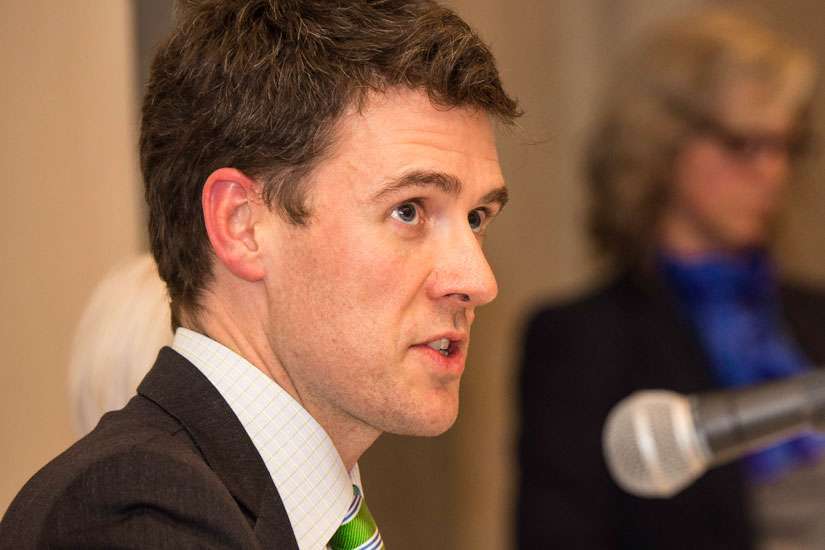
Former religious freedom ambassador embarks on new Cardus role
OTTAWA – Canadians must be willing to reject a growing perception that religion is a strictly private matter and instead be unafraid to publicly affirm their faith, said Canada’s former Religious Freedom Ambassador Andrew Bennett. Speaking May 19 at the launch of Faith in Canada 150, he also urged the rejection of the “post-Enlightenment myth” that religious belief and practices are private matters “best kept out of the public realm.” “This is historically inaccurate,” he said. “It is theologically wrong. And, above all, it robs from our fellow citizens the ability to actively participate in what can be tens of thousands of conversations, encounters, friendships and transformative actions that will strengthen our country.” Bennett’s three-year term as Religious Fresedom Ambassador ended in late March but he is staying on with Global Affairs Canada until June to help with the transition to the new Office of Human Rights, Freedoms and Inclusion, headed by Richard Arbeiter as Director General. Bennett has taken on a volunteer role with the Cardus as a senior fellow and Chair of the Cabinet of Canadians for the think tank’s Faith in Canada 150 program. He’ll oversee an ambitious national project that aims to tell the faith stories of Canada, host events and celebrations across the country, and build a network of faith leaders across Canada. “As we launch Faith in Canada 150 let us reaffirm the centrality of religious faith in Canadian history and in the lives of so many Canadians today,” Bennett said. Bennett affirmed the right of religious believers to speak up “honestly and out of deep respect for our often profoundly different beliefs.” He pointed to the professions of variety of faiths, Christian and non-Christian that have contributed to Canadian society through education, healthcare and helping the poor.
May 25, 2016

Faith Based Organizations Are Crucial to Cambridge’s Well-Being And Social Fabric
April 28, 2016
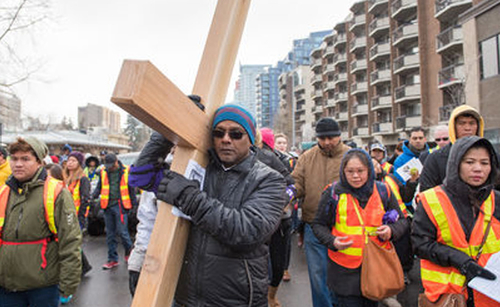
Faith in Canada 150 event in Calgary community of Inglewood to celebrate role of faith in Canada’s history
To read this article, click here.
March 23, 2016

Canada’s religious freedom ambassador Andrew Bennett set to work with Christian think-tank
Read the article in the Star here .
March 17, 2016

Can Data Standards Improve Our Common Lives?
This piece was originally published in Municipal World. Are data standards what our communities and cities need most? Certainly not. We are in much greater need of aspirations that are far more enriched than that. Our communities already suffer for the lack of aspirations that foster hope, rather than despair. Organizing and collecting useful data, however, can be very valuable if, along with that organizing and collecting, we have proper confidence in that data. Information about our communities that is clear, consistent, and available in useful forms can support our efforts to develop well-provisioned, human-centred communities and cities. Information has always been a critical resource for good decision making. Municipalities rely on all kinds of data to effectively fulfill their various responsibilities—e.g., water quality testing, assessing and collecting taxes, building permits, and information on infrastructure. With this in mind, ISO (International Organization for Standardization) has been working on a new data standard called ISO 37120:2014, designed to help municipalities consistently measure various aspects of sustainability and quality of life. Indicators for Sustainability and Quality of LifeISO 37120 is a voluntary standard that provides information for municipalities on 100 factors that ISO has identified as critical for quality of life for citizens and long-term viability for infrastructure. The standards describe what data to collect and what format the data needs to be in to allow for equivalent comparison with other municipalities. There are 46 core indicators—standards with a “shall” weighting—indicating a requirement that you need these to be an official ISO 37120 participant. These range from firefighting capacity to water quality standards. An additional 54 indicators are “should” weighted and are recommended as supports to the core indicators. ISO is a post-WWII standards organization that was started to increase the reliability and consistency of processes and information across a wide range of engineering, manufacturing, and management practices: “The foremost aim of international standardization is to facilitate the exchange of goods and services through elimination of technical barriers to trade” (ISO/TC 268 Business Plan). In addition to engineering and manufacturing, ISO standards include IT and data management, as well as social responsibility standards. Some of the standards include certification—achievement of a standard that is verified by ISO and that can be used as an industry benchmark. In the case of ISO 37120, participation is voluntary, meaning the standard is not intended to be a formal certification. Instead, it is designed to provide a framework for internal progress on measures that are deemed important to municipalities and, in turn, provide an opportunity for comparison across municipalities globally. ISO has identified that confusion on sustainability reference points and access to consistent data are key issues. Clarity and conformity are the objectives being sought with ISO 37120. Value of StandardizationThis interest in standardization for municipal data collection is intended to provide guidance on what kind of data is important to collect and how to organize that data consistently. We know that what gets measured is more likely to be attended to than what does not. The team working on ISO 37120 determined that the indicators selected are foundational for sustainability and quality of life. These base contributors are expected to foster growth and development of economic and social characteristics. Businesses and investors can use this information with greater confidence that what they are seeing is equivalent from one community to another. ISO also notes that it expects that municipalities will be able to use these measures to improve lending rates, save on insurance costs, and increase their ability to evaluate progress on municipal goals and aspirations. On the tempestuous seas of contemporary data generation, consistent standards that help leaders identify both what is important and how to measure it are increasingly relevant. We are slowly learning that having huge quantities of data doesn’t help if it’s the wrong kind of information and doesn’t address the questions we are asking. As municipalities consider adopting ISO 37120, one of the key questions for municipal leaders is: How well does ISO 37120 frame municipal sustainability and quality of life? If a given city collected and organized its data using this specific framework, would the resulting picture of the municipality be adequate? What would be missing? Additional ConsiderationsLet me propose four further questions that can help municipal decision makers evaluate the merits and limits of ISO 37120. First, how well suited is this international standard to Canadian municipalities? Given that this is an international standard, the particularities of our context needs to be considered. Interested users will notice there are a number of indicators that don’t apply to most Canadian communities. One of them is in the required “transportation” indicator section, where the core measure is the number of kilometres of high-capacity public transportation per 100,000 residents. This could be pro-rated for smaller municipalities; but, the category may simply not apply given that there are only about 50 municipalities in Canada with populations larger than 100,000. More than 3,600 of Canada’s municipalities are smaller communities, where high-capacity transit isn’t relevant. Other measures for transportation will likely be more useful as a base infrastructure indicator outside of major metropolitan areas. Another measure that reflects the international dimensions is found in the “shelter” section, where the indicator used is a percentage of city population living in slums. Though Canadian cities have had slum areas in the past, current legal and formal developments have changed the nature of housing shortages and migration patterns in Canada. Poverty, homelessness, and inadequate housing remain vital issues—but, measuring them in terms of percentage of a given city that is devoted to slums is not an effective tool. A second question when considering ISO 37120 is to ask what is missing in terms of measuring sustainability and quality of life. One of the most notable gaps is a lack of higher-order human needs, such as purpose, meaning, and belonging, as they relate to quality of life and sustainability. The needs addressed in the standard are very basic, located near the two lower levels of Maslow’s hierarchy of needs—physiological and safety/security. While these are critical needs, and necessary for effective municipal function, they are clearly not comprehensive indicators. Canadian municipalities are required to meet these needs as a requirement of laws outlining municipal responsibilities. It is possible to meet these basic needs, but leave significant issues unaddressed. Higher-order matters are particularly vital to quality of life—belonging, esteem, self-actualization. These are the arenas of purpose, meaning, and belonging that are essential for full citizenship. Similarly, the sustainability measures reflect very basic, functional matters that do not address more difficult overarching issues—such as the gap between the many who have much and the few who have little, and what narrowing that gap might mean for global resource development. In cities and communities, basic needs and higher-order needs are deeply interrelated and consistent delivery of basic services is dependent on matters such as collective trust, acceptance of legal institutions, investments in education, and so on. What isn’t clear, or included in the 198 Swiss Francs ($275 CAD) document’s standards, is a rationale for the choices made in developing the standard. ISO 26000:2010 (the standard for social responsibility and other wellbeing indicators) may need to be carefully considered alongside ISO 37120. Third, does this standard provide a data framework that will save administrators and managers time? Does it simplify the often difficult process of deciding what data is important and how it can be collected and communicated to decision makers? Wide adoption of the standard will require that its simplifications make it useful for navigating the emerging data landscape without being simplistic. One way to evaluate this sense of it would be to identify, independently, what key municipal issues are in a given context and then look at ISO 37120 to determine how those key issues are addressed (or not) by the indicators. This would prevent the standard from determining what matters to a municipality. For example, the “urban planning” section requirement only asks about the hectares of green areas present per 100,000 residents. This is important; but, for most Canadian municipalities, it would not rank high as a single measure on the planning priorities list in the same way that it might in global, informal developments, where green space can be exceedingly rare. Finally, if ISO 37120 was widely adopted in Canada, would it provide a sufficiently useful framework such that organizations like the Federation of Canadian Municipalities would find it valuable for lateral comparisons? How would it fit within or alongside other national data such as that from the National Household Survey, the various cycles of the General Social Survey, Census data, the Standards Council of Canada, or various types of market-derived data? Comparing ISO 37120 with the role that these data sources play in current municipal practice will be required in order to clearly identify where the gaps and overlaps are. Safeguarding the ProcessThe ISO does not claim to be comprehensive or sufficient for all measurement. Standards related to resilience (an important aspect of sustainability) are being developed, for example, and ISO will continue to add new standards to the more than 20,000 that have been developed since the 1940s. Disciplined, focused, and common standards can be very useful for municipal leaders as they navigate the changing conditions of their various communities, as long as we are aware that there are many assumptions, blind spots, and deep values that are quietly built into all measures. We can safeguard the process by making a parallel investment in understanding what those assumptions are and how they will shape the long-term direction of our communities and cities.
March 4, 2016

It’s time Ontario warmed up to education diversity
November 3, 2015
